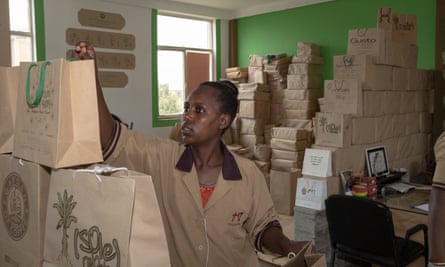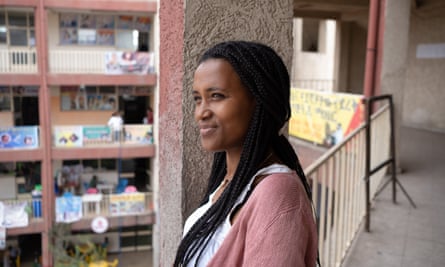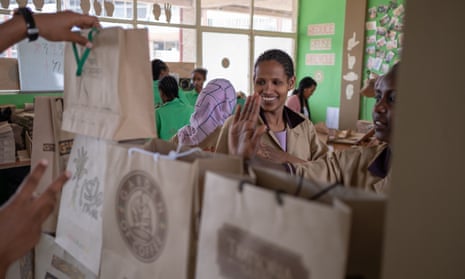What do you say to a business owner who has heard it all before? Answer: Don’t speak, use sign language.
At least that’s the novel approach taken by Teki Paper bags, an Ethiopian enterprise developed by deaf women.
They certainly have the numbers to back it up. With almost a million handmade paper bags sold, the organisation is slowly weaning the country’s bustling capital, Addis Ababa, off plastic bags while simultaneously empowering the deaf community.
As other countries in east Africa, such as Rwanda and Kenya, lead the way in eliminating single-use plastics, Ethiopia has experienced a steady increase in both plastic consumption and production since 2011.
It’s a situation that has particularly affected Addis Ababa, where plastic bags are clogging the waterways, causing floods in the rainy season and polluting the land.
“Plastic bags are cheap in Addis Ababa,” explains Mimi Legesse, the charismatic co-manager of Teki. “So business owners will give you a bag with every product you purchase.”
Clement Piguet, Teki’s co-founder, admits that persuading business owners to choose a more expensive alternative is a challenge but lecturing people about the environment won’t always have the desired impact. Instead, Teki believes that if they can also provide a clear social benefit along with the environmental impact, business owners are more likely to invest in a greener alternative.
Clement says: “With our paper bags we want to provide people with the opportunity to change the lives of deaf people, and through this create an alternative way to fight plastic.”
Meskerem Beyene, a resident interpreter at Teki, believes empowering deaf people to engage with clients has had a positive impact on the business. “When someone who can hear tries to sell the bags, people tend not to listen,” she says. “But when Mimi uses sign language people lend us their ear.”
Piguet, who is not deaf, believes sign language is a powerful communication tool, saying: “Sign language has a special power when you use it well; it has a universal aspect because we all have two hands. The way you move them, it fascinates people.”

This fascination led Piguet to visit the Alpha deaf school in his area four years ago. It was here he met Legesse, then a student, who had developed her talent for design while growing up in an orphanage.
Legesse, like many deaf people in Ethiopia, had struggled to find regular employment. “Most business owners are not open to hiring deaf people because they do not want to hire interpreters, so deaf people usually remain in their homes,” she says.
Their serendipitous encounter had an immediate effect on Piguet. “I saw from the way she was using sign language that there was something powerful about Mimi, and when she started to tell me about crochet bags she designs everything started to make sense.”

Today Teki has 18 full-time deaf employees and two interpreters, and services more than 50 clients. It has recently moved to a more central location, making it easier for clients and employees to visit.
Anis Ahmed, a local business owner interested in alternatives to plastic, came to pick up some samples, and after a whirlwind tour of the office, he departed visibly impressed. “I had no idea,” he says. “It’s just amazing to see these women at work, to see them utilising their skills.”

Anis, like all visitors, was asked to spell his name using his hands with the aid of a sign-language poster on the wall, followed by a lively question and answer session with Teki’s employees.
It can be a moving experience for some visitors. “We have around three visits per day,” says Clement. “When they see these deaf women doing such an amazing job, they get very emotional; they can start to cry.”
First impressions are important at Teki, and it can be useful to look your best. “In our culture, we give each person a name according to their appearance, or their experience,” Mimi explains with a smile. “With Donald Trump, for example, we copy his hairstyle by running our hand over our head.”

Few buildings in Addis Ababa have addresses, so bus drivers usually shout out the names of landmarks to indicate where they are heading, which makes transport particularly tricky for deaf people. Some of the women who work at Teki live two hours away. So Teki decided to cover their costs. “We want to create equal pay, especially for the ones who come from far away. I see them as warriors,” explains Clement. As a mother of two, Mimi has also ensured that mothers receive maternity leave.
Despite their success, Clement and Mimi believe they are just at the beginning of their journey. “Our dream at Teki is to initiate the hearing impaired, not just in Africa, but all around the world to fight plastic.”
